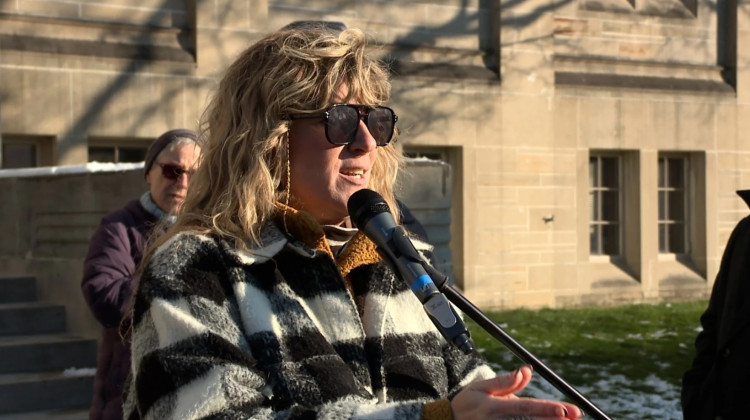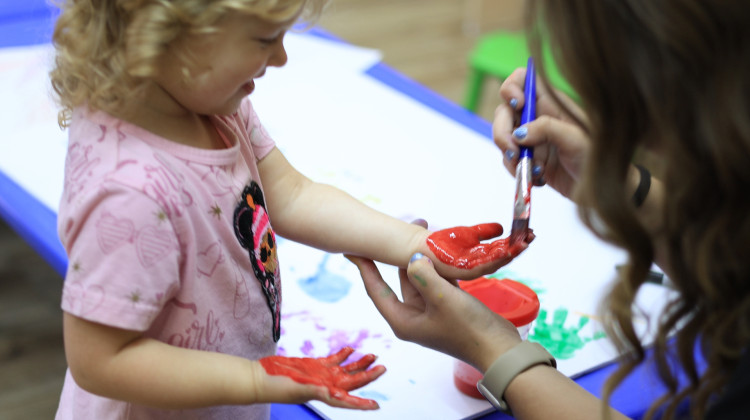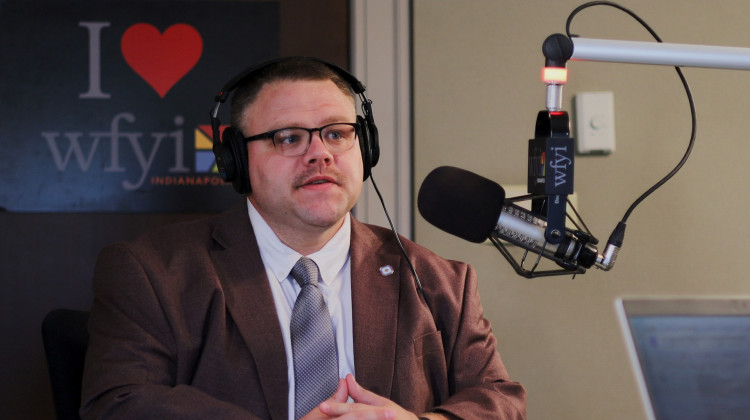
Geoffrey Gaither, the presiding Judge of the Marion County Family Division, was one of the panelists on the The Greater Indianapolis NAACP’s forum on parenting Thursday, May 21, 2021.
Zoom/WFYI NewsHours after a 12-year-old boy was shot inside an east side house while playing video games early Thursday, The Greater Indianapolis NAACP held a previously planned virtual public forum on parenting youth through perilous times. The event also comes as the city grapples with an increase in violence.
Many of the panelists encouraged adults to have open and candid conversations with children, teens and young adults. They say those talks could be the key to helping youth who are struggling and may not have a lot of parental guidance.
In attendance was Kennedy Lynem, a senior at Riverside High School. She said one of the things contributing to an increase in violence and deaths among youth is social media.
“I think there needs to be a change on, not only the amount of freedom that people receive, but the amount of freedom people receive regarding gun licenses and permits,” said Lynem.
The panelists discussed information about youth violence prevention programs, strategies for conflict resolution, anger management and group therapy. The goal is to keep youth from winding up in the criminal justice system. The Indiana Youth Institute reports 335 youth were in a state juvenile correctional facility, as of July 2020. Of those youth, half were committed for a violent crime (Offense Level I).
Akua Miller Gaylor is a mother of four and a social worker in Indianapolis. She said social media has had an impact on societal pressures on youth behavior, such as their ability to make decisions and decipher between reality and fantasy.
Miller Gaylor said having youth engage less with electronics and social media and more with their community could help. She also recommended enrolling students in organized sports to help develop teamwork and other skills.
Lynem, an aspiring criminology major, said more people and organizations to support youth could help end violence among young people.
”I have mentors that poured into me and provided a listening ear when I may not make the best choices,” said Lynem. “So if you are an adult who is listening, think about how you can pour into a younger generation without judgement or bias and try your best to love even when you do not understand. Many people may just need that listening ear.”
Geoffrey Gaither, the presiding Judge of the Marion County Family Division, has been on the bench for 26 years. He agreed with Lynem and said “programs don’t work.” But the relationships children and youth create with caring adults can have lasting impacts.
“I can’t tell you the number of times I’ve run into adults downtown or out and about who had formally been youth in the system,” said Gaither. “And they never talk about the programs, they always talk about a probation officer, a case manager or someone in their life from the system that took an interest in them.”
According to the Centers for Disease Control and Prevention, about one in five high school students across the country reported being bullied at school in 2019. During the 12 months before the survey, more than 7% of high school students had been threatened or injured with a weapon — such as a gun or knife — on school property one or more times. They also found more than one in 12 high school students reported being cyberbullied.
Kieana Dyson, a mental health counselor at Collaborative Change, said providing daily emotional support could help youth manage their anger.
“I can’t tell you how many young people I see in therapy and they’re not used to that question, ‘How are you,” she said. “Did anything happen today?’ I think as families, it’s really important that we’re opening up the door of communication to actually ask that youth, you know, how was your day at school? And helping them to kind of understand that they do have trusted adults that they can talk to.”
Dyson said many parents may have a parenting approach that is too authoritative. Such as telling children to “do as I say” or “don’t ask questions” when giving youth directions—which could lead to youth being unable to develop problem solving skills.
“If there is this authoritative approach to parenting, or just how we carry ourselves as adults in general, our young people are not going to feel safe,” said Dyson. “They’re not going to feel comfortable enough to come to us and invite us into those opportunities to help them problem solve.”
She said asking youth, “What do you think needs to be done,” could give them the space to develop conflict resolution. In addition to open communication, modeling appropriate behavior can also help parents or guardians address behavior issues with youth.
Chelsea Goodlow, a Youth Pastor at New Beginnings Fellowship Church, shared the importance of lived experience and said an adult sharing their personal story could help youth relate and engage with them.
“I don’t have teenager amnesia. I didn’t forget what it was like to be a teenager. So sometimes I have to share stories, if they can handle the story, [and] be a little bit more transparent to say, ‘Hey, I know what that was like.’”
The panelists also suggested how most in the community can do their part. One way, they said, is to vote for political candidates that would fund community programs to support youth. They also called on guardians to help youth connect with religion or a local church to help them through difficult times.
Contact WFYI education reporter Elizabeth Gabriel at egabriel@wfyi.org. Follow on Twitter: @_elizabethgabs.
 DONATE
DONATE








 Support WFYI. We can't do it without you.
Support WFYI. We can't do it without you.